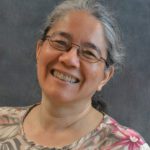
Dr. Amy Person
Dr. Amy Person, the longtime health officer of the Benton-Franklin Health District, has stepped down to serve as a regional medical officer for the state Department of Health.
Jason Zaccaria, district administrator for the health district, said Person was “a shining example” of how public health can change the lives of people, from easing those who are in pain to implementing policies to improve the lives of families.
“She leaves a legacy that will never be forgotten, and we look forward to continuing our relationship as she embraces her new role and continues to create positive change,” he said.
Her last day was Aug. 31.
Person said leaving the health district was a difficult decision.
“Navigating the challenges of the pandemic over the last 2 1/2 years, I have been reminded every day of the commitment of BFHD staff to preserving the health of the community and it has been a privilege to lead these dedicated professionals.
“I am grateful as well for the countless community members who were willing and able to look beyond themselves to care for and about their fellow residents through these difficult times. With this new role, I look forward to joining an organization that values the skills that I can bring to the job,” she said.
Interim health officer
Dr. Larry Jecha, the district’s health officer for 23 years who preceded Person, has been hired as interim health officer until a permanent replacement is found.
“We dragged him out of retirement,” Zaccaria said.
Jecha has filled similar roles around the region for years, including at the Yakima Health District, Walla Walla County Department of Community Health and health districts in Garfield and Columbia counties.
The BFHD job has been posted and is budgeted for 32 hours to 40 hours per week and offers an opportunity for hybrid remote work.
The role of a health officer is to identify community health needs and offer programs to meet those needs, and to enforce state public health statutes and all local health regulations within the district, with an emphasis on communicable disease control and environmental health.
Regional role
The state formed four new regional health districts to help counties coordinate services to better support county health officials.
The regional offices will provide additional infrastructure to implement the state Department of Health’s priorities and support health across the state.
The regional medical officers will work with local health and tribal leaders to guide and support key science, health, and medical needs across the regions and state.
Person will oversee Region 2 – Eastern Plains, which covers Benton, Franklin, Walla Walla, Adams, Columbia, Ferry, Stevens, Pend Oreille, Lincoln, Spokane, Whitman, Asotin and Garfield counties.
Her role will be to provide evidence-based public health insights within the region and area of expertise including key response challenges during emergencies.
She plans to remain in the Tri-Cities.
Person started her position as the health officer for BFHD in October 2011. She has a doctor of medicine degree from the University of Illinois College of Medicine, a master’s degree in health care informatics and a certificate in geographic information systems from the University of Wisconsin. She is board-certified in pediatrics.
Prior to joining the health district, Person provided clinical pediatric care in Milwaukee, Wisconsin, for 18 years, primarily addressing the health care needs of underserved adolescents and children.
BFHD board to expand
As the Benton-Franklin Health District searches for Person’s permanent replacement, it also seeks four additional members to serve on its board, a new requirement passed by the state Legislature in 2021.
The current board is made up of elected county commissioners: Benton County Commissioners Will McKay (serving as vice chair), Jerome Delvin and Shon Small; and Franklin County Commissioners Rocky Mullen (serving as chair), Brad Peck and Clint Didier.
HB 1152 aims to eliminate politics from local public health boards by requiring that they include a balance of elected officials and nonelected people who have a diversity of expertise and life experience, according to the bill’s sponsor, Rep. Marcus Riccelli, D-Spokane.
“We have seen all too clearly what happens when politics infects public health. Whether it is in Spokane, Yakima, or Pierce County, we need to ensure that our health boards put science, medicine, people, and public health over politics,” he said in a statement. “Everyone everywhere in Washington should be able to rely on a standard level of public health.”
One member will be appointed by the American Indian Health Commission.
One must be a health care provider and one must be a community stakeholder.
The fourth new member must be a consumer of public health. This may be a resident who has faced significant health inequities or has experiences with public health-related programs. People from historically marginalized and underrepresented communities are encouraged to serve.
The new members will serve two-year terms and will have voting power on all matters except those related to setting or modifying permits, licensing and application fees.
Zaccaria expects the expanded board to be in place by January.
More information about how to apply for the board seats will be listed on the health district’s website in September.
